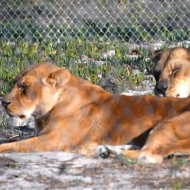
Move forms part of airline’s commitment to end ‘exploitative tourism’
A new rescued lion enclosure in South Africa has been opened by British Airways Holidays in partnership with Born Free. The enclosure is already home to two lionesses, Alpha and Cora, who were initially rescued from a failed zoo in Spain.
The move follows British Airways' announcement earlier this year about the launch of its new animal welfare policy. Developed in partnership with Born Free, the policy aims to bring an end to ‘exploitative tourism’ that sees animals kept in captivity.
Born Free provided specialist care to the lionesses as they travelled from their temporary home in Belgium to London, and then on a British Airways flight to Cape Town. Alpha and Cora then travelled a short distance by road to the 40-acre Panthera Africa Big Cat Sanctuary in South Africa.
The lionesses are settling into their brand new enclosure, which is a world away from the cramped and neglected conditions they were experiencing in Spain and will allow them to exhibit natural behaviour. The zoo in Spain has been closed following a raft of infringements.
Claire Bentley, managing director of British Airways Holiday, said: “We are delighted to have been able to support Born Free and enable Alpha and Cora to spend the rest of their lives in their natural habitat. We know our customers are behind us in supporting causes like this and we are proud that our new Animal Welfare Policy and its various initiatives will help improve the lives of animals living in captivity all over the world.”
Forming part of the partnership between Born Free and British Airways is the “Raise the Red Flag” Initiative that allows members of the public to report concerns about wild animals being kept in captivity.
Dr. Chris Draper, head of animal welfare & captivity at Born Free, said: “It’s extremely gratifying to see how much Alpha and Cora have improved and are settling into their brand-new enclosure. It is virtually impossible to enable big cats brought up in horrific conditions in captivity to be released to the wild, so their new home will create an environment as close to their natural habitat as possible and encourage them to exhibit their natural behaviour.”
Image (C) Born Free.



 BSAVA is to partner with BVA Live (11-12 June 2026) to champion clinical research.
BSAVA is to partner with BVA Live (11-12 June 2026) to champion clinical research.